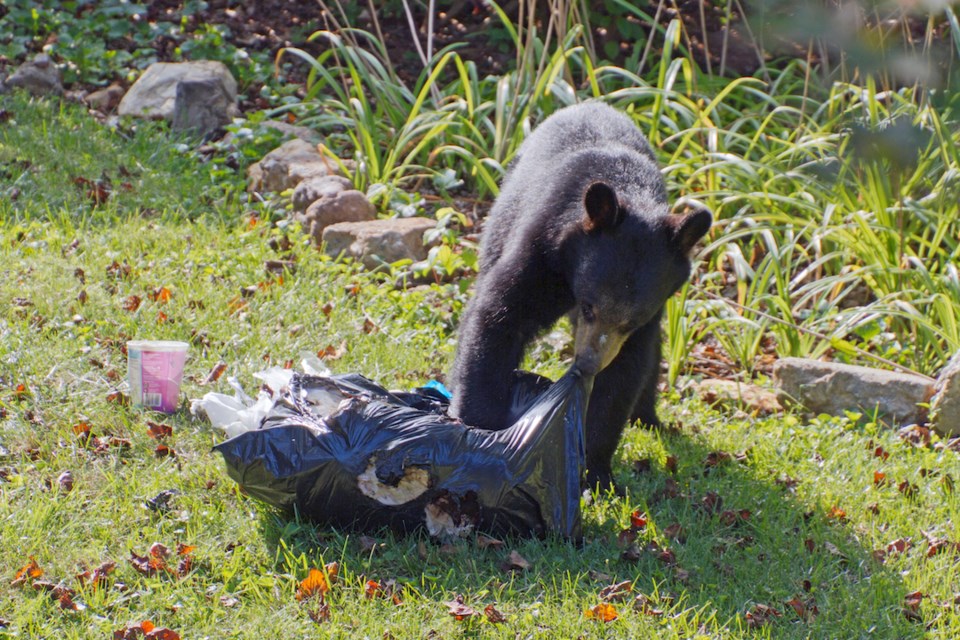A provincial conservation officer says bears have very long memories, which is why if they find food just once in a location, there’s a good chance they’ll return in hopes of scrounging more.
“It's just part of their survival mechanisms, to have these kinds of food-reward memories,” says provincial conservation officer Sgt. Dean Miller. “So, they remember that it's garbage day. That’s very difficult because people work and they need to put out the garbage and bears are smart and have these pattern responses. Sometimes bears are so good, they'll come every Wednesday because that's garbage day. They hear a sound and they come.”
Miller understands most people do their best to keep their trash locked up until the morning of garbage day as advised but adds there are often extenuating circumstances, such as shift work, which prevents them from doing so.
It’s that long-term memory that had Miller concerned when he read about a bear entering a kitchen in Elphinstone two weeks ago. As reported in the Coast Reporter, the bear broke into a woman’s kitchen and was raiding her fridge and freezer, when she enlisted the help of a neighbour to get it out. They managed to get the animal out and shut and locked the door but the bear returned and attempted to get back into the house.
By making noise, they managed to get the bear out of the yard and the neighbour encouraged it up the street by making noise by banging two logs together. His efforts were hindered by neighbours attempting to get photos of the bear with their cell phones.
Miller says the best course of action should have been for the woman to leave the house if possible and call either a conservation officer or 911.
“Hopefully in a case like this, you kind of hope that a door is open, like the bear came in through the door and that door remained open while the bear was inside,” says Miller. “We've had situations where people have left their door open, a bear walks in and just incidentally, bumps it, and then the door closes behind the bear. And that happens in vehicles quite a bit too. And you know, basically the interior of the vehicle is a write-off afterwards and houses as well. Bears are very strong and can do lots of damage in a short period of time.”
Miller notes in this case, that bear likely started off with simple attractants such as a fruit tree or available food on garbage day.
“When a bear has accesses to a caloric intake, it gets rewarded,” says Miller. “Bears are terrestrial animals and they're just going to walk and they're curious and we have lots of habituated food-conditioned bears on the Coast. But I would say that when a bear enters into a home, that is a form of very extreme habituation. So, a bear in a house? Yeah, it's nothing we want. We don't want bears as pets. They're not pets. They're wildlife. And we really don't want them in our yards other than just a walk-through kind of thing. They’re going to stroll through and just keep going.”
As for people taking photos of the bear, Miller says the more human interaction a bear has, the more comfortable it becomes.
“Bears should be and are naturally fearful of humans and that's what we want,” says Miller. “That's going to keep bears wild. That's the ultimate end goal. Big, dominant male bears are sometimes unpredictable. And I'm not preaching fear by any means, but keep a respectful distance for sure for your own safety and the safety of the people in your neighbourhood.”
He adds it’s also not good to increase bear populations by supplying them with high caloric, human-related foods because bears will naturally survive at a rate equal to whatever the landscape can provide.
“There's generations of bears that breed in and around human-occupied areas and the population numbers go up because they tend to be free of predators,” he says. “And they're supplementing their diet with non-natural foods. And it also is known to biologically increase the fecundity and sows, so they have delayed implantation when they become impregnated, but the amount of cell division is based on how much that sow eats.”
He says a sow that’s getting a lot of calories through sources like garbage and bird feeders, will tend to produce more cubs.
Miller says this particular bear incident wasn’t reported and he hadn’t heard about it until he read it in the Coast Reporter — and he’s not surprised.
“There is a big movement out there to discourage people from phoning the conservation office service, but we’re very well trained and we're connected with a provincial veterinarian and wildlife biologist,” says Miller. “We understand this issue and the population and management and, ultimately, at the end of the day, we're a public safety agency, so our intention is really to keep the public safe. And if we're not getting those reports, where bears are going into houses, they're just going to go into another house and that may be a more unfortunate circumstance involving kids or an elderly person.”
For more information on making your home and yard as unattractive to bears as possible, visit WildSafe BC. To report a wildlife encounter or bear in your kitchen, call the 24-hour line at 1-877-952-7277 or dial #7277 on the TELUS Mobility Network. Miller notes there are only three conservation officers to handle both the Sunshine Coast and Sea-to-Sky corridor, so if a situation is serious calling 911 is your best option.



